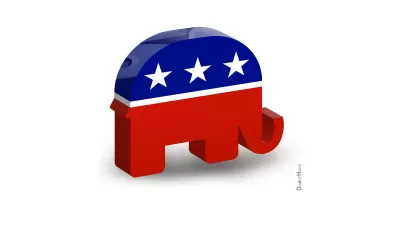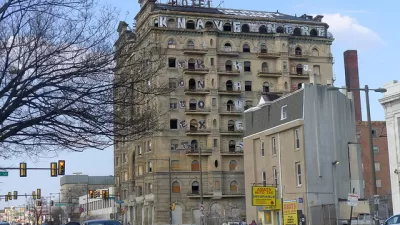There's not a lot of talk about cities or urban issues among the Republicans running for president, according to this piece from Salon.
None of the GOP's presidential contenders is much of a city-dweller, and few have made comments suggestive of urban-centric policy should they be elected.
"'Really poor children in really poor neighborhoods,' mused Gingrich, 'have no habits of working and have nobody around them who works They have no habit of 'I do this and you give me cash,' unless it's illegal.'
Gingrich's comment is an example of surviving remnant of dog-whistle politics that demonize urban residents; recent examples include new state laws to drug-test those on public assistance and the ongoing effort to cut food stamps (and Gingrich did call Obama the 'food stamp president'). The specter of the black ghetto still scripts urban dwellers as villains (often as thieves robbing the citizen either directly, or as in this Rick Santorum comment, indirectly: 'I don't want to make black people's lives better by giving them other people's money'). But unlike the era of Ronald Reagan's welfare queen, today cities are more ignored than attacked. And this goes well beyond Iowa.
'The core of the Republican constituency in metropolitan America are the growing, racially and economically exclusive ‘outer suburbs' whose privileged status Republicans seek to protect at all costs,' says former mayor of Albuquerque David Rusk, now a consultant. He cited New Jersey Gov. Chris Christie as an exemplar of the trend," writes author Daniel Denvir in Salon.
Thanks to Nate Berg
FULL STORY: Iowa-centric candidates ignore the urban crisis

Planetizen Federal Action Tracker
A weekly monitor of how Trump’s orders and actions are impacting planners and planning in America.

Maui's Vacation Rental Debate Turns Ugly
Verbal attacks, misinformation campaigns and fistfights plague a high-stakes debate to convert thousands of vacation rentals into long-term housing.

Restaurant Patios Were a Pandemic Win — Why Were They so Hard to Keep?
Social distancing requirements and changes in travel patterns prompted cities to pilot new uses for street and sidewalk space. Then it got complicated.

In California Battle of Housing vs. Environment, Housing Just Won
A new state law significantly limits the power of CEQA, an environmental review law that served as a powerful tool for blocking new development.

Boulder Eliminates Parking Minimums Citywide
Officials estimate the cost of building a single underground parking space at up to $100,000.

Orange County, Florida Adopts Largest US “Sprawl Repair” Code
The ‘Orange Code’ seeks to rectify decades of sprawl-inducing, car-oriented development.
Urban Design for Planners 1: Software Tools
This six-course series explores essential urban design concepts using open source software and equips planners with the tools they need to participate fully in the urban design process.
Planning for Universal Design
Learn the tools for implementing Universal Design in planning regulations.
Heyer Gruel & Associates PA
JM Goldson LLC
Custer County Colorado
City of Camden Redevelopment Agency
City of Astoria
Transportation Research & Education Center (TREC) at Portland State University
Jefferson Parish Government
Camden Redevelopment Agency
City of Claremont





























